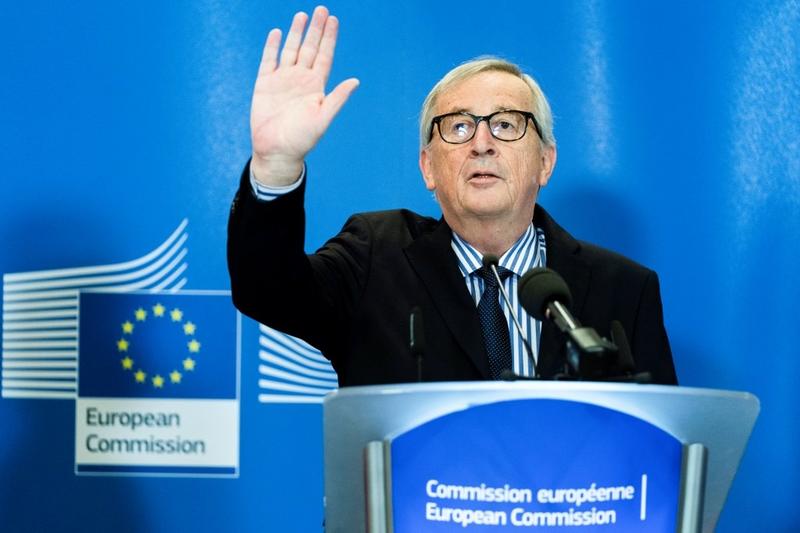 Outgoing European Commission President Jean-Claude Juncker delivers a speech during the handing-over ceremony at the European Union's headquarters, in Brussels, on Dec 3, 2019. (KENZO TRIBOUILLARD / POOL / AFP)
Outgoing European Commission President Jean-Claude Juncker delivers a speech during the handing-over ceremony at the European Union's headquarters, in Brussels, on Dec 3, 2019. (KENZO TRIBOUILLARD / POOL / AFP)
It reads like the plot from a spy novel, with illicit recordings from a bugged timepiece, an encrypted disk full of secrets, a bizarre code-name and the ouster of one of Europe’s longest-serving leaders.
The case centers on allegations that three members of Luxembourg’s intelligence service misappropriated the data CD supposedly containing evidence about a series of unsolved bombings in the country in the 1980s
Rather than Cold War Moscow, Vienna or London, the events that unfolded in 2013 took place in sleepy Luxembourg, with revelations about a seemingly out-of-control secret service triggering the end of Jean-Claude Juncker’s career as the tiny nation’s prime minister.
Seven years and two adjournments of the trial later and Juncker, who recently completed a term as president of the European Commission in Brussels, must relive the scandal that lost him the premiership to rival Xavier Bettel, as three former spies stand trial in hearings starting Tuesday.
ALSO READ: New EU chief prepared for challenges
“Historically, this will remain the case that led to Juncker’s downfall” in his home country, Alex Bodry, a Socialist politician who headed the parliamentary commission that investigated the revelations in 2013, said in an interview before he left politics in January to become a member of the nation’s State Council.
The case centers on allegations that three members of Luxembourg’s intelligence service misappropriated the data CD supposedly containing evidence about a series of unsolved bombings in the country in the 1980s. Agents are accused of illegally eavesdropping on the man who handed over the disk, to help them decipher its content.
Awkward questions
While Juncker, who’s been convalescing following surgery to treat an aneurysm, isn’t on trial, the case will revisit awkward questions. It will shed light on his alleged lack of oversight of spying operations, for which, as head of government, he was held politically responsible and blamed for failing to take action earlier or to inform lawmakers.
The secret service was accused of irregularities and possible illegal activities, especially during the period from 2004 to 2008, according to the 2013 report to parliament, triggered by disclosures in the press that the former head of the agency had secretly recorded a conversation with Juncker, using a watch with a hidden bug.
The service was created in 1960 more as a counter-espionage agency to monitor enemies during the Cold War, but also to have agents to communicate with counterparts abroad. It’s an agency that doesn’t get involved in the kind of subterfuge conducted by the likes of France, the UK, or Russia, according to Gerald Arboit, a researcher in European intelligence history.
“It’s not a James Bond-style operation,” said Arboit, who is specialized in European intelligence services, including the one in Luxembourg. “This is about a small service that deals with small matters.”
Trip-ups
In the grander scheme of things, “there are probably more trip-ups, clandestine cobbling together and such in the world of politics than in the world of intelligence,” said Arboit.
Marco Mille, who headed the intelligence agency from 2003 to 2010, is one of the three defendants in the trial, together with former agents Andre Kemmer and Frank Schneider. The court hearings are scheduled to run until March 13.
Juncker, who was prime minister of Luxembourg from 1995 until 2013, has denied any personal liability, but political forces in the nation turned against him in mid-2013 when he faced a no-confidence vote after a two-hour long grilling session by lawmakers.
Bettel, who took over as Luxembourg’s prime minister in December 2013, pointed the finger at Juncker for failing to keep the spies under control. “There’s no more trust to be had in the prime minister,” Bettel told parliament at the time.
READ MORE: Juncker: EU open to Huawei's 5G business
While the wider scandal, known as the Frisbee affair, may appear parochial from outside the country, from the inside, it remains one of its biggest political flashpoints.
“It wasn’t just a small affair,” said Bodry. “It was one of the most fascinating and extraordinary, but also one of the most complex, cases I have seen in my entire political life.”


